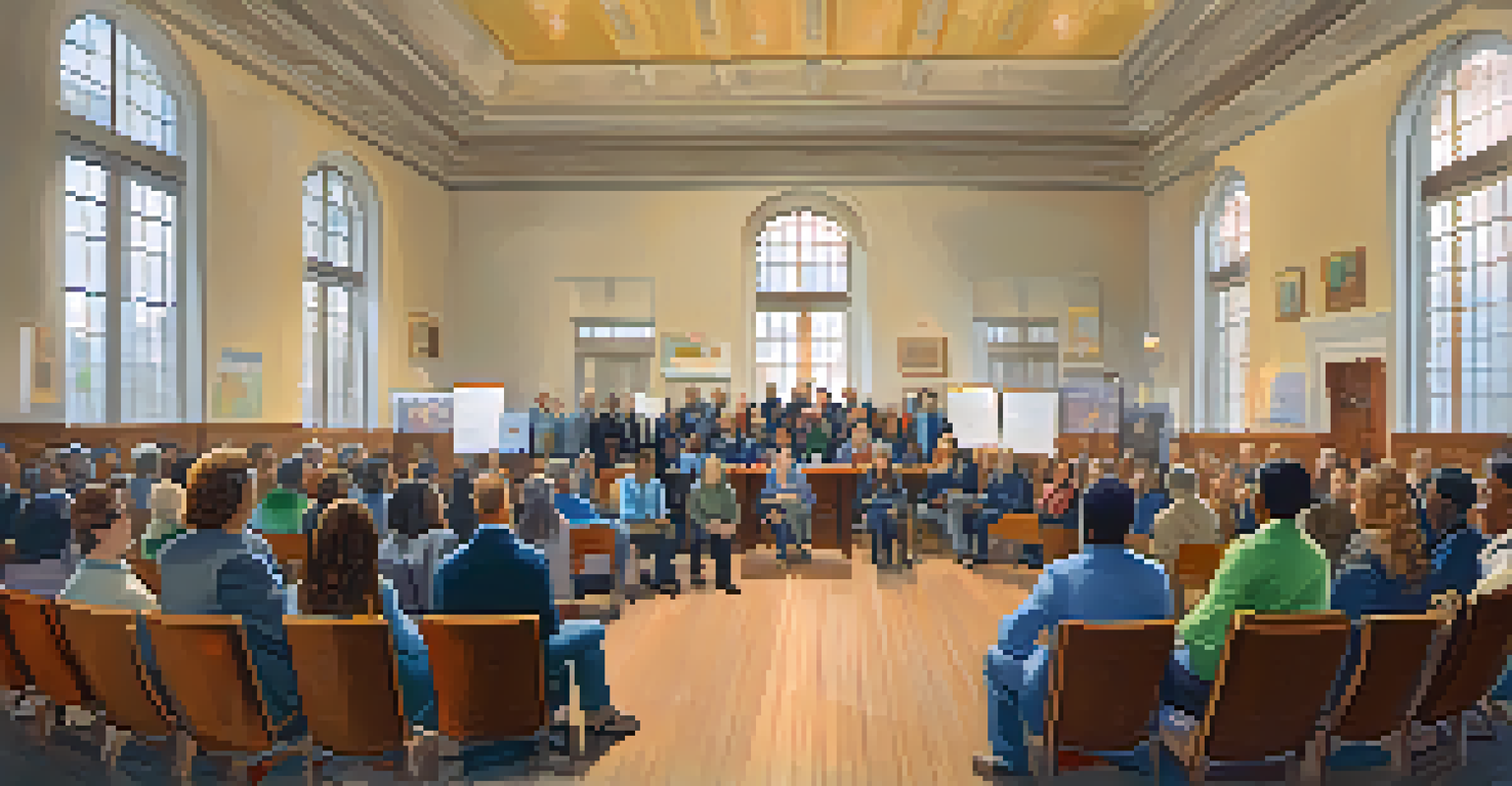Challenges Facing DAOs in Governance and Decision-Making

Understanding the Basics of DAO Governance
Decentralized Autonomous Organizations, or DAOs, are a novel way of organizing people around shared goals, utilizing blockchain technology to facilitate decision-making. Unlike traditional organizations, where a hierarchy often dictates actions, DAOs aim for a more egalitarian approach. This means every member can have a say in governance, but it also introduces complexity in ensuring that all voices are heard.
In a world where everything is connected, the most powerful thing we can do is to take action together.
To put it simply, think of a DAO like a community garden where every participant can plant their ideas. However, coordinating who plants what, when, and where can lead to disagreements and confusion if not managed properly. Therefore, understanding the foundational elements of DAO governance is crucial for addressing the challenges that arise.
Ultimately, while the idea of collective decision-making is appealing, it also requires a robust framework to avoid chaos. This sets the stage for us to explore the various hurdles DAOs face in governance and how they can overcome them.
Decision-Making Processes: Who Gets a Vote?
One of the central challenges in DAO governance is determining who has the right to vote on key decisions. Unlike traditional organizations where roles are clearly defined, DAOs often struggle with establishing a fair voting system that reflects the interests of all members. This can lead to situations where a small group holds disproportionate power, undermining the democratic ethos of the DAO.

Imagine a town hall meeting where only a few residents can speak while others remain silent. It can quickly become frustrating for those who feel their opinions matter less. Ensuring that every member has an equal opportunity to contribute can be a daunting task, especially in larger DAOs with diverse interests.
Democratic Challenges in DAOs
Establishing a fair voting system in DAOs is crucial to ensure that all members have an equal say in decision-making.
To tackle this issue, many DAOs are experimenting with different voting mechanisms, such as quadratic voting or token-based systems. However, these methods come with their own complexities and may require continuous adjustments to maintain fairness and inclusivity.
Voter Apathy: Engaging Community Members
Voter apathy is a common hurdle in DAO governance, where members may feel disconnected from the decision-making process. This disengagement often stems from a lack of clarity about the DAO's goals or the impact of their votes. If members don’t see how their participation matters, they may choose to abstain, leading to underwhelming engagement levels.
Democracy is not just about voting; it's about participation and engagement in the community.
Think of it like a group project in school where only a few people do the work while others sit back and relax. The enthusiasm of the active participants can dwindle when they don’t see their peers contributing. Thus, fostering a sense of belonging and purpose is vital for encouraging active participation in DAOs.
To combat voter apathy, many DAOs are implementing strategies that enhance communication and provide education about governance processes. By making the implications of decisions clear and celebrating participation, they can bring more members into the fold and invigorate the community.
Balancing Speed and Inclusivity in Decision-Making
In the fast-paced world of blockchain and cryptocurrency, DAOs often face the challenge of balancing quick decision-making with inclusivity. Speed is critical when seizing opportunities, but rushing can lead to decisions that don’t reflect the collective will of the members. This tension can create frustration and mistrust within the community.
Picture a relay race where the baton must be passed quickly to win, but if the handoff is sloppy, the team risks losing the race. Similarly, DAOs need to find ways to streamline their processes without sacrificing the input and ideas of their members. Striking this balance is essential for fostering a healthy governance culture.
Combatting Voter Apathy
Engaging community members through clear communication and education is essential to overcoming voter apathy in DAOs.
Some DAOs are adopting time-sensitive voting mechanisms to encourage prompt decisions while still allowing for community input. This approach can help maintain momentum without sidelining the voices that matter most.
Addressing Conflict Resolution: Finding Common Ground
Conflicts are inevitable in any organization, and DAOs are no exception. The challenge lies in creating effective mechanisms for conflict resolution that do not alienate members or stifle dissenting opinions. Without a clear process, disagreements can escalate, leading to division and disengagement.
Think of it as a family disagreement over what to watch on movie night. If there’s no way to mediate the discussion, it can lead to frustration and resentment. DAOs need to establish frameworks that allow for healthy discourse and resolution to ensure everyone feels heard and respected.
Many DAOs are exploring community-led arbitration or mediation processes as ways to address conflicts. By empowering members to participate in these resolutions, DAOs can cultivate a culture of understanding and collaboration.
Legal and Regulatory Uncertainties: Navigating the Landscape
As innovative entities, DAOs often exist in a legal gray area, which poses significant challenges for governance and decision-making. The lack of clear regulations can lead to confusion about responsibilities, liabilities, and the enforceability of decisions made within the organization. This uncertainty can hamper participation and trust among members.
Imagine trying to play a game without knowing the rules—frustrating, right? Similarly, without clarity on the legal framework that governs DAOs, members may feel hesitant to engage fully. It’s essential for DAOs to stay informed about evolving regulations and adapt their governance structures accordingly.
Navigating Legal Uncertainties
DAOs must address legal and regulatory challenges to foster trust and participation among their members.
Some DAOs are proactively working with legal experts to establish best practices and find ways to align their operations with existing laws. This foresight can help alleviate concerns and foster a more secure environment for decision-making.
Future Directions: Innovations in DAO Governance
Despite the numerous challenges facing DAOs in governance, there is a silver lining: innovation. The very nature of DAOs encourages experimentation with new governance models and decision-making processes, allowing them to adapt and evolve over time. This adaptability can lead to more effective and inclusive governance structures.
Consider how startups often pivot their business models in response to feedback and market demands. DAOs can take a similar approach by continuously refining their governance strategies based on member input and emerging best practices. This iterative process not only enhances engagement but also strengthens the organization as a whole.

Looking ahead, we can expect to see more DAOs embracing technology, like on-chain governance tools, to streamline processes and foster transparency. By leveraging these innovations, DAOs can tackle governance challenges and pave the way for a more collaborative future.